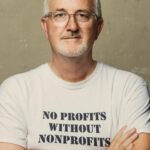Robert Egger: “Our Sector Is About To Be Hit, And Hit Hard” A Blue Avocado Interview
Robert Egger on advice to young nonprofit leaders, how the sector has changed, and why it’s more important than ever that we take risks.

“We need a big, overarching strategy that coordinates all the community’s resources to achieve audacious objectives.”
For 24 years, Robert Egger served as president of the DC Central Kitchen, which has created more than 30 million meals and helped 1,500 men and women gain full-time employment. Today he runs the astoundingly successful L.A. Kitchen on the same model of food recovery, job training and social enterprise.
In the interview below, Egger dishes to Blue Avocado on what he would tell young nonprofit leaders, how the sector has changed since he got into it three decades ago, and why it’s more important than ever that we take risks.
What is the biggest change in the nonprofit sector since you entered?
When I jumped into the mix in ‘88, running a nonprofit was still more of a calling than a career. This was pre-internet, pre-cable and pre-MBAs in nonprofit management… so most of us were literally making it up as we went along. And while the list of “changes” could fill pages, I’m more bummed at what hasn’t changed. At the top of my list? The fact that nonprofits are still not viewed as businesses by our elected leaders, let alone deemed essential to any community’s economic vitality. Hopefully, a new generation of nonprofit leaders will tackle that big issue and seek to own and channel our collective power.
What advice would you give to young nonprofit leaders about what you wish you had known when you started in this field?
When I got started, I didn’t really understand, or appreciate, the role of advocacy. Now I do. There is no change without policy. We cannot sit by and merely do good work… we must seek common ground, build on it and forward fresh ideas. That said, I would suggest that young leaders not look to D.C. for leadership on this issue. I don’t think ANY of the D.C. based trade associations that purport to “lead” our sector have a clear agenda, let alone the courage to take the risks required in these critical times.
What is the biggest misconception about nonprofit work? Any ideas on how that can be changed?
The biggest misconception is that we can fix what ails our communities with charitable donations. Sadly, we spent decades convincing donors that if they gave us money, we could make real change in our communities. We do powerful work, but I wish we had the courage to challenge donors, volunteers and our elected leaders to realize that we need a big, overarching strategy that coordinates all the community’s resources to achieve audacious objectives.
Who is making positive change in the nonprofit sector today?
Millennials are rocking it with new ideas about tech, Xers are surging into management roles and bringing new life to often-moribund organizations, and I’m happy to see so many Boomers coming in as both volunteers and leaders. We are a leading growth industry in America, so we should wildly welcome both new blood and brains.
What are your thoughts about getting nonprofits more involved in influencing national policy making?
I think we should avoid that trap of looking to our D.C.-based, national associations for leadership, and instead focus on city and state elections. We should host candidate forums in every election, to discuss how candidates would partner with us. We should be mad users of new media to channel our private time and energy, so that we can be politically engaged without jeopardizing our (c)3 status. I think we need to start pooling our outcomes to better reflect the economic role we play in creating jobs, and attracting investment dollars. ALL of this centers around owning our collective strength, and finding strategic moments to stand together.
You have been involved in the food industry for a long time. What are the trends you think are most interesting there?
Healthy food for all. I think that the nonprofit “anti-hunger” sector has to own its decades-long role in pushing low-nutritional foods into marginalized communities in the name of “feeding the poor.” From now on, we need to focus on distributing healthy food, with few exceptions. I’m also buoyed by the political role chefs are playing, and I think we need to join them in compelling candidates to talk about food policies.
What “practical and provocative food-for-thought” do you have for Blue Avocado readers?
Our sector is about to be hit, and hit hard. We’re going to be expected to do more, for more, with less. While I honor our past, and those who led, I think we must be wide open to every new idea, every new tactic, and every new alliance. If you think you don’t have time to partner, or to be part of the bigger effort to decrease the need for charity, then you’re part of the problem, no matter how noble your work. As Tom Waits once sang, “Come down off the cross, we need the wood.”
Do you have an inspiring story you would like to tell us?
No… get to work and inspire yourself.
You might also like:
- Vision Before Strategy: A Nonprofit’s Guide to Defining Success
- Can You Hear Us Now? Using Feedback to Create Community-Centered Services
- Hedging Your Bets: Rajiv Shah, and the Limits of Large-Scale Changemaking
- Unlocking Potential: Collective Leadership in Nonprofits
- The 3 ‘Rs’ of Equitable Community Engagement
You made it to the end! Please share this article!
Let’s help other nonprofit leaders succeed! Consider sharing this article with your friends and colleagues via email or social media.
About the Author
Robert Egger originated the community kitchen/social enterprise model, now replicated globally. He made payroll for 30 years, while remaining 100% open-source to any and all seeking information about job training, empowerment, social enterprise, and nonprofit political activism. A noted author and speaker, he is now 100% dedicated to supporting young leaders. He can be reached at regger@fuckingshitup.net
Articles on Blue Avocado do not provide legal representation or legal advice and should not be used as a substitute for advice or legal counsel. Blue Avocado provides space for the nonprofit sector to express new ideas. The opinions and views expressed in this article are solely those of the authors. They do not purport to reflect or imply the opinions or views of Blue Avocado, its publisher, or affiliated organizations. Blue Avocado, its publisher, and affiliated organizations are not liable for website visitors’ use of the content on Blue Avocado nor for visitors’ decisions about using the Blue Avocado website.








I am a veteran of the environmental field. Much of what Robert Egger says resonates. We are going to have to think different. But some of us have always been advocates, and very much contest local elections. I was th first Green Party legislative candidate in the US in 1986 . As the very part time administrator of the coaliton of environmental groups in Rhode Island, the environmental community does much on the ground work,as well as advocacy. i make videos of tadpoles so I can demonstrate new ways to manage stormwater, but i balance those with testimony at the legislature pointing out how there is no data that even suggests that loosening environmental rules increases the GDP. Sadly we go forward into a world in which actual facts mean little. Memes and cultural wars trump actual information and communities with little real info go astray. Lucky I long ago realized that no one would ever fund or pay for that writing or speaing out, so I have managed to avoid some of the funding traps (I work with and manage finances for about 6 different organizations) due to effective frugality. Allows me to say things that no one else is willing to say. And while the revolution will not be funded, it will be blogged.
Greg Gerritt
Activist, Writer, Forest Gnome
Providence RI 02906
www ProsperityForRI.com
ww theMoshassuck.org
Youtube Moshassuckcritters
I just became a ED for a 30 year non profit. The original non profit was formed to comply to an affordable HUD 202 program. for 27 years the non profit was nothing more than a group of volunteer resident Board members acting as a management oversight entity for a 84 unit subsidized property for 62 and/or disabled very low income tenants.
I positioned the property to be sold before the Mortgage was paid took on a partner in the property who then did a renovation of 5.2M with tax credit and refinance. The non profit stayed on as a 1% owner and receive the proceeds of sale.
I am from a traditional business background so first rule is to protect the asset. We have been developing a CSA ( TOWER GARDEN FARM) Community Sponsored Agriculture AND WE GENERATE INCOME FROM SUPPLYING LOCAL RESTAURANTS WITH PRODUCE AS MEMBERS. I love your article and it tells me that I am on the right track with developing a sustainable income for our non profit to reduce dependency on grants and donations. We have taken the risk and we have invest over $500,000 and still have the original proceeds of funds we started with. I would love the opportunity to talk to Robert for 5mins. My number is (805) 341-1457 call collect.
I think we must be wide open to every new idea, every new tactic, and every new alliance. If you think you don’t have time to partner, or to be part of the bigger effort to decrease the need for charity, then you’re part of the problem, no matter how noble your work. but i balance those with testimony at the legislature pointing out how there is no data that even suggests that loosening environmental rules increases the GDP. Sadly we go forward into a world in which actual facts mean little. Dien hoa tuoi